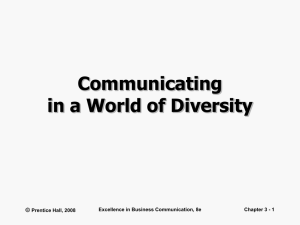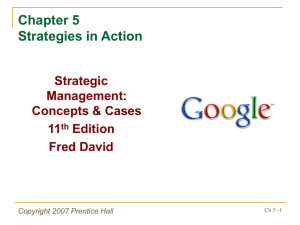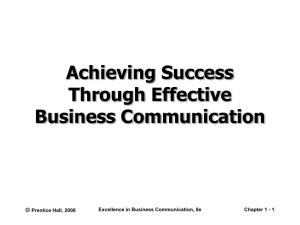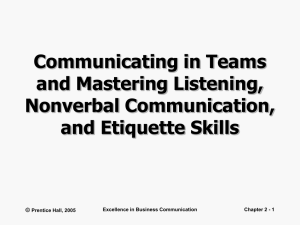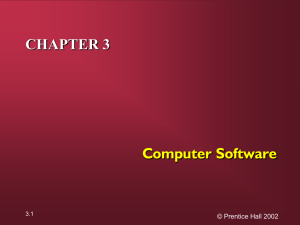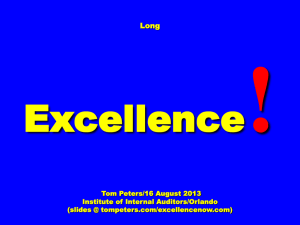Communicating Interculturally
advertisement
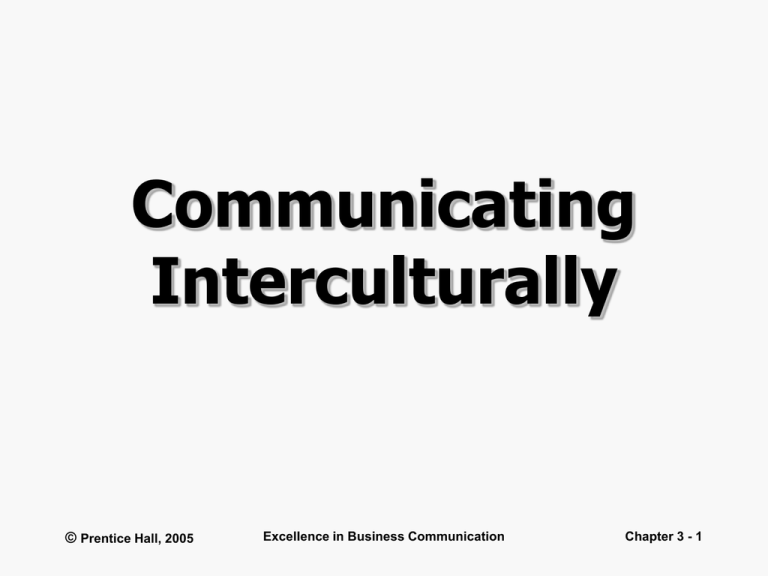
Communicating Interculturally © Prentice Hall, 2005 Excellence in Business Communication Chapter 3 - 1 Intercultural Communication Market Globalization Multicultural Workforce © Prentice Hall, 2005 Excellence in Business Communication Chapter 3 - 2 Intercultural Sensitivity Culture Subculture Ethnocentrism © Prentice Hall, 2005 Excellence in Business Communication Chapter 3 - 3 Cultural Differences Contextual Legal and Ethical Social Nonverbal © Prentice Hall, 2005 Excellence in Business Communication Chapter 3 - 4 Cultural Context High Context Decision Making Practices High Context Problem Solving Techniques Low Context © Prentice Hall, 2005 Negotiating Styles Excellence in Business Communication Low Context Chapter 3 - 5 Legal and Ethical Behavior Seek Common Ground Withhold Judgment Send Honest Messages Respect Differences © Prentice Hall, 2005 Excellence in Business Communication Chapter 3 - 6 Social Behavior Differences Materialism Roles Status Manners Time © Prentice Hall, 2005 Excellence in Business Communication Chapter 3 - 7 Nonverbal Communication Personal Space Body Language © Prentice Hall, 2005 Excellence in Business Communication Chapter 3 - 8 Overcome Ethnocentrism Accept Distinctions Avoid Assumptions Avoid Judgments © Prentice Hall, 2005 Excellence in Business Communication Chapter 3 - 9 Communicating Across Cultures Study Other Cultures Overcome Language Barriers Develop Skills in Communication Social Customs English as a Second Language Writing Skills Business Protocols Foreign Language Speaking Skills © Prentice Hall, 2005 Excellence in Business Communication Chapter 3 - 10 Study Other Cultures • Assume differences • Take responsibility • Withhold judgment • Show respect • Empathize • Tolerate ambiguity © Prentice Hall, 2005 Excellence in Business Communication Chapter 3 - 11 Study Other Cultures • Look past the superficial • Be patient • Be persistent • Admit cultural biases • Remain flexible © Prentice Hall, 2005 Excellence in Business Communication Chapter 3 - 12 Study Other Cultures • Look for common ground • Send clear messages • Deal with the individual • Learn when to be direct • Test your understanding © Prentice Hall, 2005 Excellence in Business Communication Chapter 3 - 13 ESL Communication Barriers Slang and Idioms Accents and Pronunciation Vocal Variations Communication Styles © Prentice Hall, 2005 Excellence in Business Communication Chapter 3 - 14 Foreign Language Barriers Learn Another Language Hire a Translator Use an Intermediary Offer Training In English © Prentice Hall, 2005 Excellence in Business Communication Chapter 3 - 15 Written Communication Use Plain English Strive for Clarity Use Proper Addresses Cite Numbers Carefully © Prentice Hall, 2005 Excellence in Business Communication Chapter 3 - 16 Written Communication Strive for Brevity Use Transitions Avoid Slang and Idioms Keep Paragraphs Short © Prentice Hall, 2005 Excellence in Business Communication Chapter 3 - 17 Oral Communication Minimize Noise Obtain Feedback Speak Slowly Clarify Intent Do Not Talk Down Use Accurate Language © Prentice Hall, 2005 Excellence in Business Communication Chapter 3 - 18 Oral Communication Learn Foreign Phrases Listen Carefully Adapt Your Style Check for Understanding Clarify the Next Step Watch Body Language © Prentice Hall, 2005 Excellence in Business Communication Chapter 3 - 19
